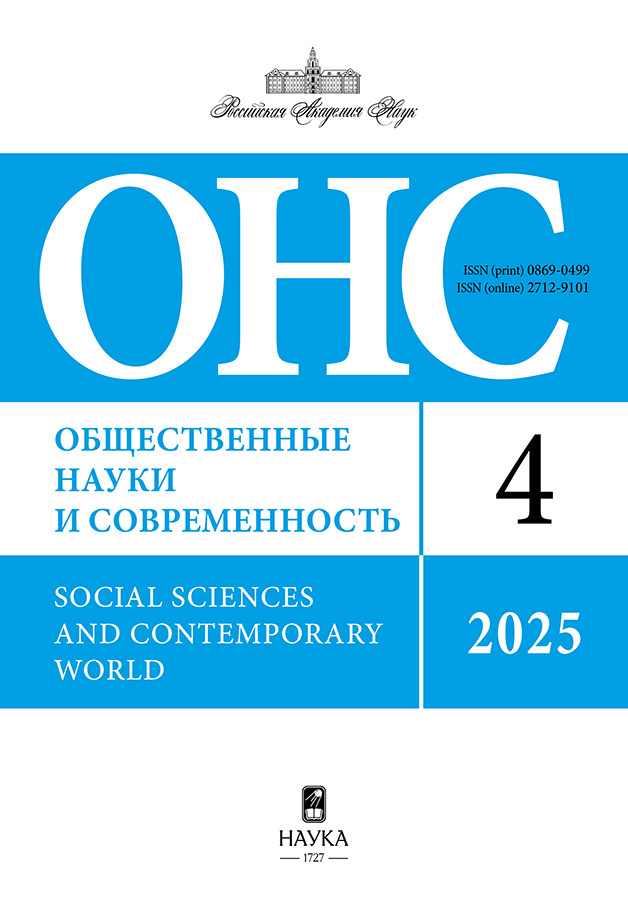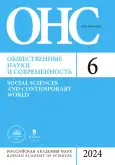The сollective subject in the digital age
- Authors: Sukharev M.V.1
-
Affiliations:
- Karelia Scientific Center of RAS
- Issue: No 6 (2024)
- Pages: 41-56
- Section: Digitalization tendencies
- URL: https://gynecology.orscience.ru/0869-0499/article/view/681323
- DOI: https://doi.org/10.31857/S0869049924060035
- EDN: https://elibrary.ru/JBZKGZ
- ID: 681323
Cite item
Abstract
The problem of the collective subject (CS) is studied in the context of new areas of scientific research: the theory of large evolutionary transitions (MET – major evolutionary transitions) and digital philosophy and sociology. Digital philosophy and sociology explore the fundamental impact of digitalization on society and cognition. MET is a theory that originates in the biological problem of the transition from unicellular microorganisms to multicellular «superorganisms» which are a whole at a new level. Later, the idea of the MET was extrapolated to society as a system consisting of organisms, and invaded the field of sociology and philosophy. The most important means of uniting organisms into such groups as a tribe, a people, a nation, is language. The emergence of new ways of communication (writing and printing) has played a fundamental role in the development of society as a CS. At the end of the 20th century, new means of communication were developed – digital information systems. Unlike writing, these systems have their own activity and lead to fundamental changes in society precisely as a CS, as a subject of cognition, social management and development. The possibility of using MET theory to deepen the understanding of CS of cognition (scientific communities) is considered, as well as CS of management, and the impact of digital systems on deeping cognitive processes in social CS.
Full Text
About the authors
Mikhail V. Sukharev
Karelia Scientific Center of RAS
Author for correspondence.
Email: suharev@narod.ru
ORCID iD: 0000-0003-3190-9893
Candidate of Sciences (Economics), Senior Research Fellow
Russian Federation, PetrozavodskReferences
- Выготский Л.С. (2005) Психология развития человека. М.: Изд-во Смысл; Изд-во Эксмо. 1136 с. Vygotskij L.S. (2005) Psikhologiya Razvitiya Cheloveka [Psychology of human development]. Moscow: Smysl Publ.; Jeksmo Publ. 1136 pp. (In Russ.)
- Громыко Ю.В. (2004) Сценарная паноплия: сценарий для России: русский путь: новая повестка дня для президента. М.: [б.и., ГП Псковская обл. тип.]. 398 с. Gromyko Ju.V. (2004) Sstenarnaya panopliya: scenarii dlya Rossii: russkii put’: novaya povestka dnya dlya prezidenta [Scenario panoply: a scenario for Russia: The Russian way: a new agenda for the president]. Pskov: Pskov Obl Typ Publ. 398 p. (In Russ.)
- Гумбольдт В. фон (2000) Избранные труды по языкознанию. М.: ОАО ИГ Прогресс. 396 с. Humboldt V. Von (2000) Izbrannye trudy po yazykoznaniyu [Selected works on linguistics]. M.: Progress Publ. 396 p. (In Russ.)
- Гуревич Л.С. (2009) Ментальная визуализация абстрактных образов: когнитивные склейки // Вестник ИГЛУ. № 1 (5). С. 100–105. Gurevich L.S Mental visualization of abstract images: cognitive gluing. Bulletin of IGLU. no. 1 (5). pp. 100–105.
- Дюркгейм Э. (1990) О разделении общественного труда. Метод социологии. М.: Наука. 575 с. Durkheim E. (1990) O razdelenii obschestvennogo truda. Metod sociologii [On the division of social labor. Method of sociology]. Moscow: Nauka Publ. 575 p. (In Russ.)
- Дорфман Я.Г. (2007) Всемирная история физики: С древнейших времен до конца XVIII века. М.: КомКнига. 352 с. Dorfman Y.G. (2007) Vsemirnaya istoriya fiziki: S drevnejshikh vremen do kontsa XVIII veka [World history of physics: From ancient times to the end of the XVIII century]. Moscow: KomKniga Publ. 352 p. (In Russ.)
- Касавин И.Т. (2016) Социальная философия науки и коллективная эпистемология. М.: Издательство ВесьМир. 264 с. Kasavin I.T. (2016) Social’naya filosofiya nauki i kollektivnaya epistemologiya [Social philosophy of science and collective epistemology]. Moscow: Ves’ Mir Publ. 264 p. (In Russ.)
- Касавин И.Т. (2018) О поисках философской предметности в исследованиях науки // Эпистемология сегодня. Идеи, проблемы, дискуссии: монография. Ред.: чл.-корр. РАН И.Т. Касавин, Н.Н. Воронина. Н. Новгород: Изд-во НГУ им. Н.И. Лобачевского. С. 406–413. Kasavin I.T. (2018) O poiskakh filosofskoi predmetnosti v issledovaniyakh nauki [On the search for philosophical objectivity in the research of science]. In: Kasavin and N.N. Voronina (eds). Epistemologiya segodnya. Idei, problemy, diskussii: monografiya. N. Novgorod: NNSU Publ. Pp. 406–413. (In Russ.)
- Князева Е.Н. (2020) Визуальные образы на службе когнитивной науки // ΠΡΑΞΗMΑ. Проблемы визуальной семиотики. Вып. 1 (23). С. 58–75. https://doi.org/10.23951/2312-7899-2020-1-58-75 Knyazeva E.N. (2020) Visual images in the service of cognitive science. ΠΡΑΞΗMA. Problemy Vizualnoy Semiotiki. Issue 1 (23). Pp. 58–75. https://doi.org/10.23951/2312-7899-2020-1-58-75
- Кремянский В.И. (1969) Структурные уровни живой материи. Теоретические и методологические проблемы. М.: Наука. 300 с. Kremyansky V.I. (1969) Strukturnye urovni zhivoi materii. Teoreticheskie I Metodologicheskie Problemy [Structural levels of living matter. Theoretical and methodological problems]. Moscow: Nauka Publ. 300 p. (In Russ.)
- Кун Т. (1977) Структура научных революций. С вводной статьей и дополнениями 1969 г. М.: Прогресс. 300 с. Kuhn T. (1977) Struktura nauchnykh revolyucii. S vvodnoi state’i i dopolneniyami 1969 g. [Structure of Scientific revolutions. With an introductory article and additions of 1969]. Moscow: Progress Publ. 300 p. (In Russ.)
- Макаров М.Л. (2003) Основы теории дискурса. М.: ИТДГК «Гнозис». 280 с. Makarov M.L. (2003) Osnovy Teorii Diskursa [Fundamentals of the theory of discourse]. Moscow: Gnosis Publ. 280 с. (In Russ.)
- Малышев Ю.М. (2020) К онтологии искусственного интеллекта // Философия и гуманитарные науки в информационном обществе. № 4(30). С. 46–59. Malyshev Yu.M. (2020) To the ontology of artificial intelligence. Filosofija I Gumanitarnye Nauki v Informatsionnom Obshсhestve. vol. 4(30). pp. 46–59. (In Russ.)
- Мамчур Е.А. (2018) Как анализировать социальные измерения знания? // Эпистемология сегодня. Идеи, проблемы, дискуссии: монография. Ред.: чл.-корр. РАН И.Т. Касавин, Н.Н. Воронина. Н. Новгород: Изд-во НГУ им. Н.И. Лобачевского. С. 373–384. Mamchur E.A. (2018) Kak analizirovat’ social’nye izmereniya znaniya? [How to analyze the social dimensions of knowledge?]. In: Epistemologiya segodnya. Idei, problemy, diskussii: monografiya. Kasavin and N.N. Voronina (eds). N. Novgorod: NNSU Publ. pp. 373–384. (In Russ.)
- Мироненко И.А. (2010) Субъект и личность: о соотношении понятий // Методология и история психологии. № 5(1). С. 149–55. Mironenko I.A. (2010) Subject and personality: on the correlation of concepts. Metodologija i istorija psihologii. vol. 5(1). pp. 149–55. (In Russ.)
- Потебня А.А. (1999) Полное собрание трудов: Мысль и язык. М.: Лабиринт, 1999. 291 с. Potebnya A.A. (1999) Polnoe sobranie trudov: Mysl’ i yazyk [Complete works: Thought and language]. Moscow: Labyrinth Publ. 291 p. (In Russ.)
- Проненко Е.А. (2024). Конструкт «ментальные модели»: его сущность и использование в различных областях психологии // Инновационная наука: психология, педагогика, дефектология, 7(4), 92–100. https://doi.org/10.23947/2658-7165-2024-7-4-92-100 Pronenko E.A. (2024). The construct «mental models»: its essence and use in various fields of psychology. Innovacionnaya nauka: psihologiya, pedagogika, defektologiya, 7(4), 92–100. http://doi.org/10.23947/2658-7165-2024-7-4-92-100
- Психология индивидуального и группового субъекта (2002) Ред.: А.В. Брушлинский, М.И. Воловикова. М.: ПЕР СЭ. 368 с. Psikhologiya individual’nogo i gruppovogo sub»ekta [Psychology of individual and group subject]. (2002) Brushlinsky A.V., Volovikova M.I. (eds.) Moskow. PER SE Publ. 368 p. (In Russ.)
- Ричардсон Т.Э.Д. (2006) Мысленные образы: Когнитивный подход / Пер. с англ. М.: «Когито-Центр». 175 с. Richardson T.E`.D. (2006) Myslennye obrazy: Kognitivnyi Podhod / Per. s angl. [Mental Images: A Cognitive approach] M.: «Kogito-Centr». 175 p.
- Рубинштейн С.Л. (2002) Основы общей психологии. СПб.: Питер. 720 с. Rubinstein S.L. (2002) Osnovy obshei psikhologii [Fundamentals of general psychology]. St. Petersburg: Piter Publ. 720 pp. (In Russ.)
- Рубинштейн С.Л. (2003) Бытие и сознание. Человек и мир. СПб.: Питер. 512 с. Rubinstein S.L. (2003) Bytie I Soznanie. Chelovek i mir [Being and Consciousness. Man and the world]. St. Petersburg: Piter Publ. 512 p. (In Russ.)
- Сорокин П.А. (1992) Человек. Цивилизация. Общество. Мыслители XX века. Ред. Согомонов А.Ю. М.: Политиздат. 543 с. Sorokin P.A. (1992) Chelovek. Tsivilizatsiya. Obshchestvo. Mysliteli XX veka [Man. Civilization. Society. Thinkers of the XX century]. Moskow: Politizdat Publ. 340 p. (In Russ.)
- Социогуманитарные аспекты ситуационных центров развития (2017) Ред.: В.Е. Лепский, А.Н. Райков. М.: Когито-Центр. 417 с. Sociogumanitarnye aspekty situacionnyh centrov razvitiya [Socio-humanitarian aspects of situational development centers]. (2017) V.E. Lepsky, A.N. Raikov (eds.). Moskow: Kogito-Center. 417 p. (In Russ.)
- Стратегическое целеполагание в ситуационных центрах развития (2018) Ред.: В.Е. Лепский, А.Н. Райко. М.: Когито-Центр. 320 с. Strategicheskoe Tselepolaganie v situatsionnykh centrakh razvitiya [Strategic goal setting in situational development centers] (2018) V.E. Lepsky, A.N. Raikov (eds.). Moskow: Kogito-Center. 320 p. (In Russ.)
- Сухарев М.В. (2023) Идеоматериальные полисистемы и политика // Политическая концептология. № 1, С. 15–33. https://doi.org/10.18522/2949-0707.2023.1.1533 Sukharev M.V. (2023) Ideomaterial polysystems and politics. Politicheskaja Conceptologiya. no. 1, pp. 15–33. (In Russ.). https://doi.org/10.18522/2949-0707.2023.1.1533
- Турчин В.Ф. (2000) Феномен науки: Кибернетический подход к эволюции. Изд. 2-е М.: ЭТС. 368 с. Turchin V.F. (2000) Fenomen nauki: Kiberneticheskii podhod k evoljutsii [The phenomenon of science: A Cybernetic approach to evolution]. Moskow: ETS Publ. 368 p. (In Russ.)
- Koch C. Jones A. (2016) Big Science, Team Science, and Open Science for Neuroscience. Neuron, vol. 92, no. 3, pp. 612–616. https://doi.org/10.1016/j.neuron.2016.10.019
- Johnson-Laird, P. N. (1980). Mental Models in Cognitive Science. Cognitive Science, 4(1), 71–115. https://doi.org/10.1207/s15516709cog0401_4
- Meškelė D., Frasincar F. (2020) ALDONAR: A hybrid solution for sentence-level aspect-based sentiment analysis using a lexicalized domain ontology and a regularized neural attention model. Information Processing & Management. vol. 57, no. 3. 102211.
- Nonacs P., Denton K.K., Robin A.N., Helanterä H., Kapheim K.M. (2022) Editorial: Social evolution and the what, when, why and how of the major evolutionary transitions in the history of life. Front. Ecol. Evol. 10:1109484.
- Robin A.N., Denton K.K., Lowell H., DulayE.S., T. Ebrahimi S., Johnson G.C., Mai D., O’Fallon S., Philson C.S., Speck H.P., Zhang X.P., Nonacs P. (2021) Major Evolutionary Transitions and the Roles of Facilitation and Information in Ecosystem Transformations. Front. Ecol. Evol. 9:711556.
- da Silva J. (2021) Life History and the Transitions to Eusociality in the Hymenoptera. Front. Ecol. Evol. 9:727124.
- Smith M.J., Szathmáry E. (1999) The Origins of Life: From the Birth of Life to the Origin of Language. Oxford: Oxford University Press. 192 p.
- Smuts J.C. (1927) Holism and Evolution. London. MacMillan and Co. 398 p.
- Strauss D. (2006) Beyond the opposition of individual and society, Part 1: Acknowledging the constitutive social function of being an individual and ‘de-totalizing’ the idea of ‘society’. South African Review of Sociology, 37:2. pp. 143–164.
- Sukharev M.V., Kozyreva G.B. (2019) Ideomaterial Polysystems. Indian Journal of Science and Technology. vol. 12(4). https://doi.org/10.17485/ijst/2019/v12i4/139222
- Szathmáry E., Smith J. (1995) The major evolutionary transitions. Nature, vol. 374. pp. 227–232. https://doi.org/10.1038/374227a0
- Tuomela R. (2013) Social Ontology: Collective Intentionality and Group Agents. Oxford University Press.
- Van Dijk, T.A. (1998) Ideology: A Multidisciplinary Approach. SAGE Publications, London.
- West S. A., Fisher R. M., Gardner, A., Kiers E. T. (2015) Major evolutionary transitions in individuality. Proceedings of the National Academy of Sciences of the United States of America.vol. 112(33). pp. 10112–10119.
Supplementary files








